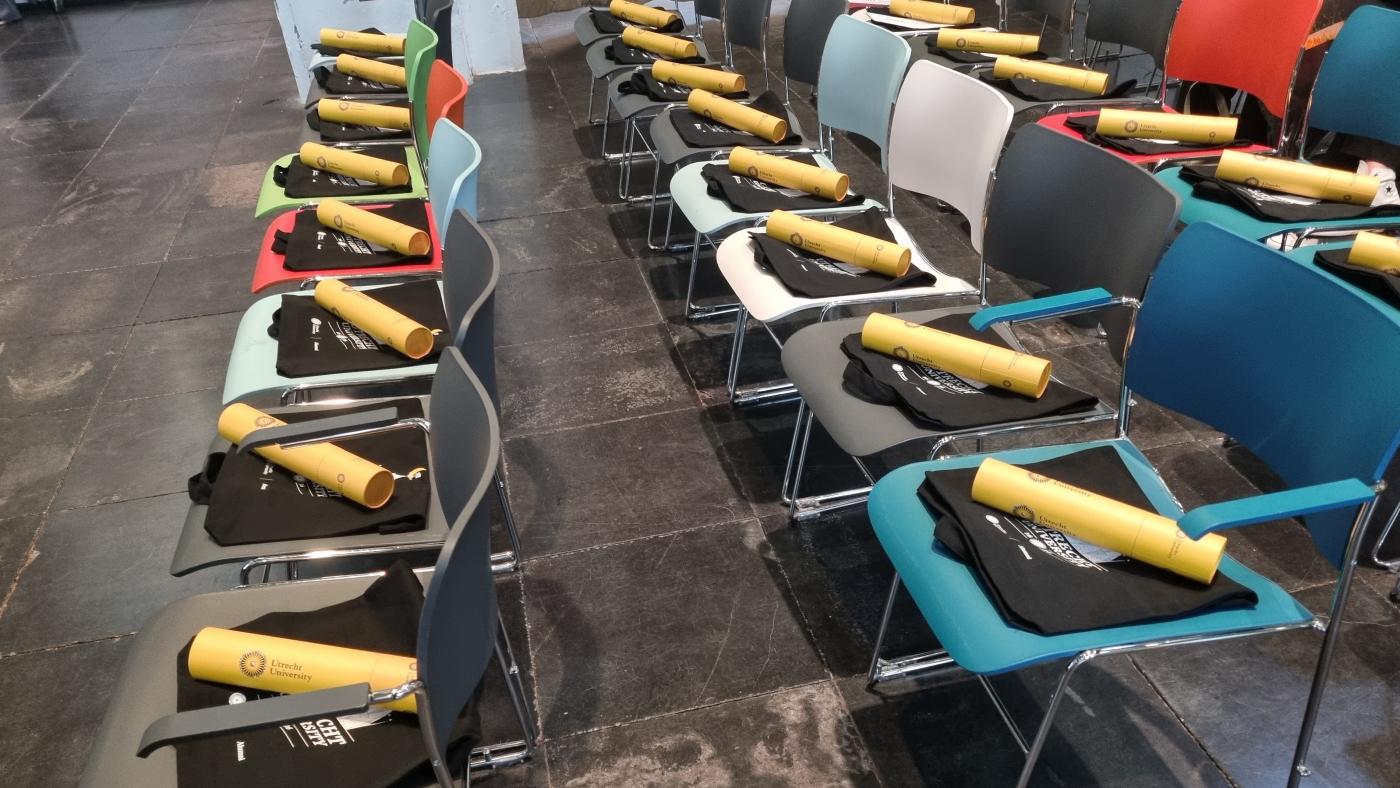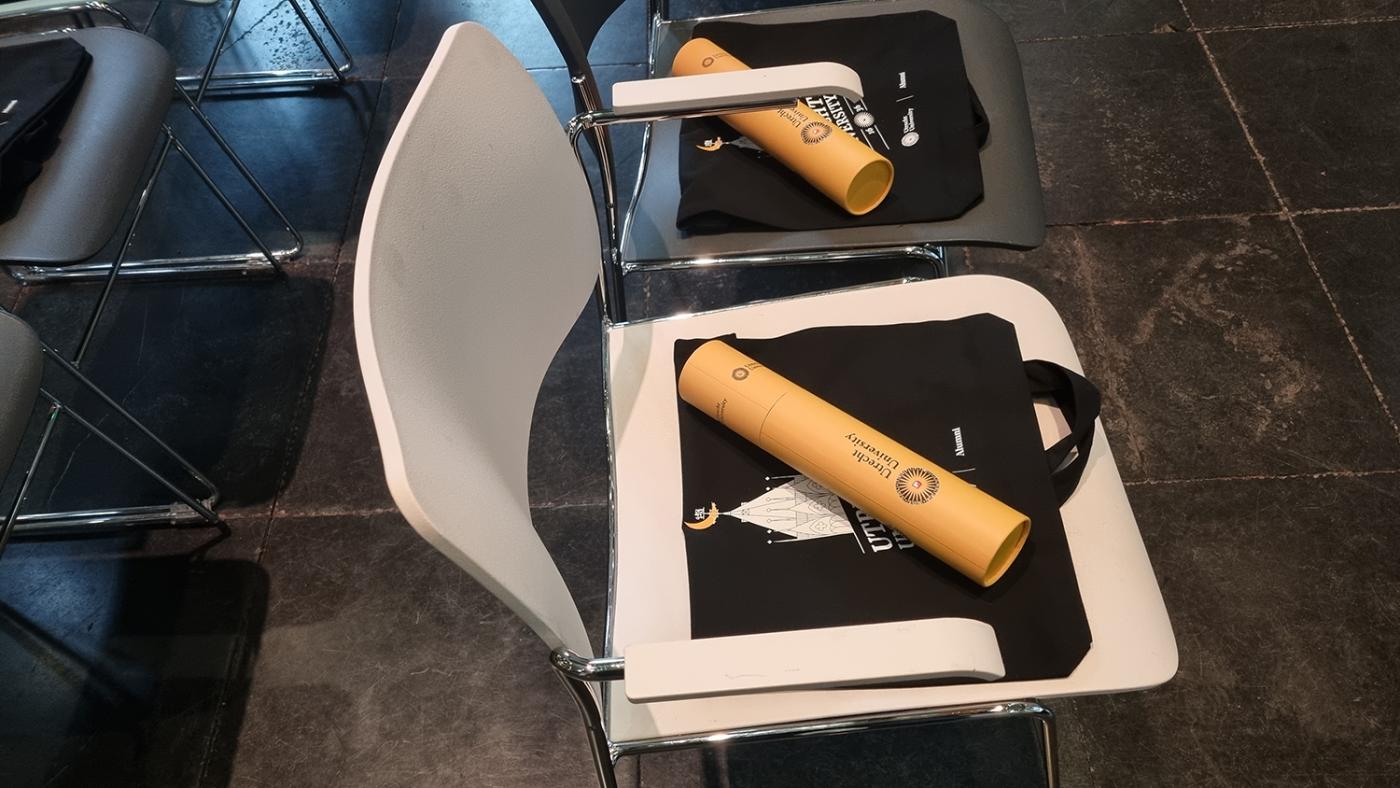Four guests is enough
Must grandma be at the graduation ceremony? Not necessarily, says DUB Panel

“How many people can I bring?” That's usually the first question students' parents ask upon hearing the date of the graduation ceremony. And many of them get disappointed when they hear the answer.
UU says it considers graduation ceremonies as a "festive" occasion and an opportunity to portray itself in a positive way to the friends and family members of its graduates. However, the number of people each graduate is allowed to invite varies considerably across faculties.
Those who graduated with a Master's degree in Social and Behavioral Sciences this month could only bring three people to Geertekerk, for example. Graduates from the Utrecht University School of Governance (USG), whose ceremony took place at the Utrecht University Building, could have a much bigger entourage: eight people.
How many friends and family members should each student be allowed to invite? We asked the DUB panel, our panel of students and employees, to put their two cents in.
Pedagogical scientist Kirsten Buist argues that it is simply impossible for many Social Sciences programmes to be generous in that regard. After all, for some Bachelor’s degrees, there can be over a hundred graduates in a single day. This means there is no time for a speech that gives a good impression of the study and the route to graduation.
The programmes with which Buist is involved allow no more than three guests per student. However, it is possible to request a livestream. “The only way to change things would be using larger rooms and spreading the ceremony over more days, but that would take even more time from teachers and coordinators, not to mention it would cost more money. It just wouldn’t be feasible for our programmes.”
Master’s student Sterre van Wierst also says it would be too expensive for programmes not to set a limit on the number of guests. She suggests “a nice middle ground”: a central investment from UU to provide good AV support so that every graduation ceremony is live-streamed and has a professional photographer. “This way, those who stay at home can still celebrate the success of their loved ones from a distance.”
In her view, four or five "live" guests is a reasonable number. “It’s nice to have your family members at the ceremony. That would be the parents plus one or two siblings.”
Cold study point
Psychology student Levi Bierhuizen also acknowledges that study programmes establish these limits due to organisational issues. At the same time, he understands that it’s no fun when students can’t invite everyone they would like. The fact that the number of guests allowed depends on the programme is “obviously not fair”.
He finds four people a good number, even though he comes from a family with four children. However, some people have fewer siblings, so Levi thinks that students can talk to each other and see if everyone will show up with the maximum number of guests allowed. Someone might have spare tickets.
As far as IT course coordinator Laura Hompus is concerned, it is impossible to use a single standard for all programmes, given the differences in scope. “Filling an auditorium for a cohort of ten students is pretty different from doing that for a hundred students.”
She suggests a pragmatic solution: allowing everyone to bring three guests for free. Graduates who want to invite more people could buy up to three additional tickets. “This would cover the costs for bigger venues and additional logistics. It would also allow the organisers to better estimate the number of attendees."
She wonders what students and their guests value most: the moment the graduate gets their diploma or the dinner that comes afterwards, when everyone has the diploma in their pockets. “Personally, I picked up my diploma six months later at a cold study point on Drift. it didn’t interest me at all.”

Half-empty room
Educational scientist Casper Hulshof also considers four guests a realistic number but finds it okay to deviate from that limit from time to time, such as when graduates want to bring a good friend along in addition to family members. “But in the study programmes I'm involved with, there is never really a problem in terms of space. The important thing is to provide some coffee beforehand because some people sometimes come from far away."
Urban geographer Irina van Aalst does not identify a capacity problem, either. She is only involved with graduation ceremonies for Master’s programmes. “They always happen in the Utrecht University Building auditorium, where we often have the opposite problem: a half-empty hall!”
According to biologist Suzan Ruijtenberg, it is hard to find an optimal solution. “The hall is often not full during graduation ceremonies, even though some people would have liked to bring more guests.”
“Ideally, close family members would be present at all times. Some students have no guests. I recently gave a speech for someone without any brothers or sisters, and their parents had died. In other cases, the number of guests may be as many as ten. It is painful if someone is alone, but it is also unfair if not all siblings can come because of a limit on the number of guests.”
Ruijtenberg suggests a system in which graduates could register up to four people and make unused seats available for others. “But that would involve lots of extra administration, which is undesirable.”